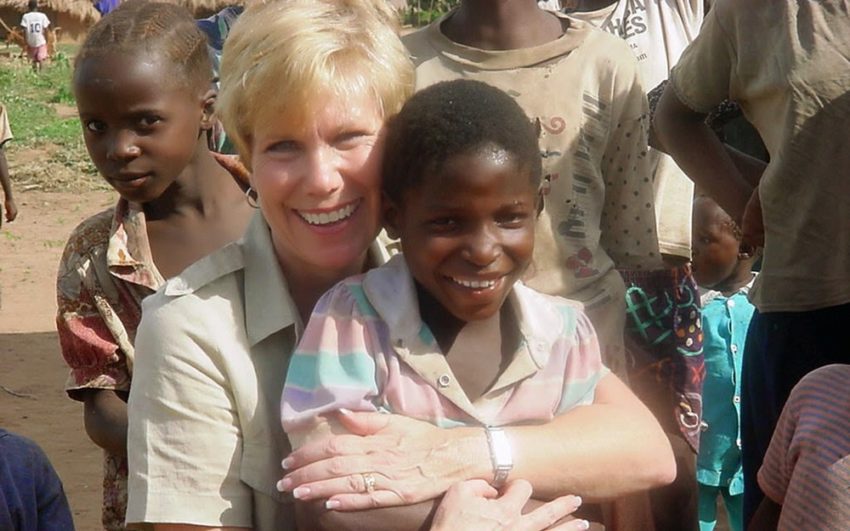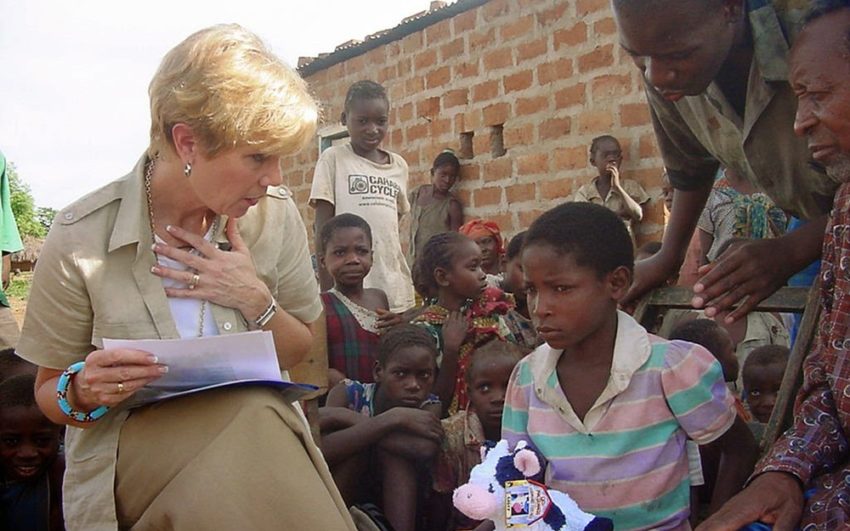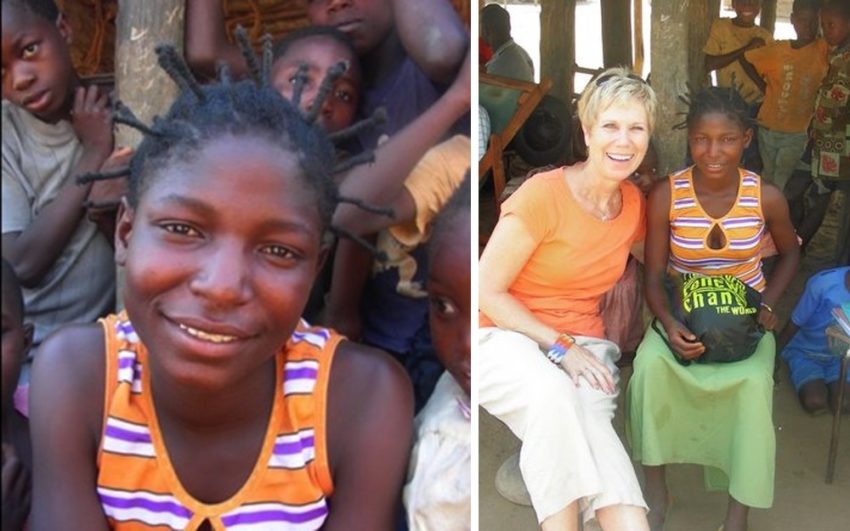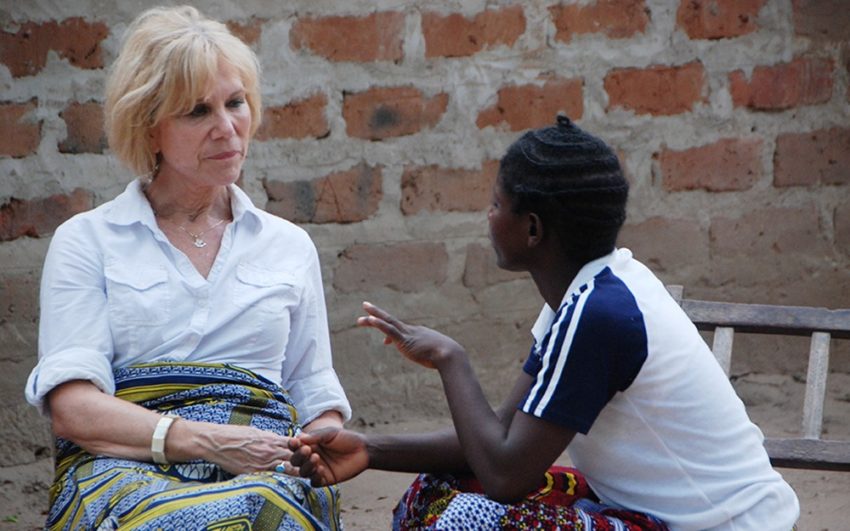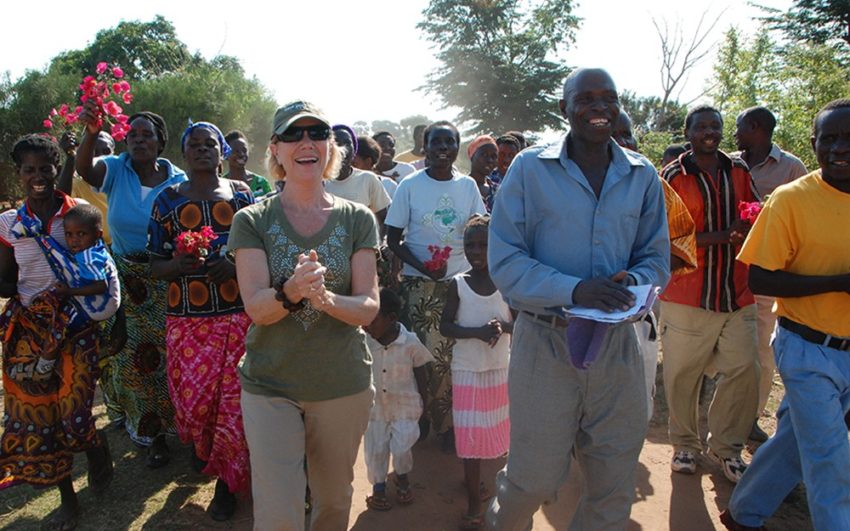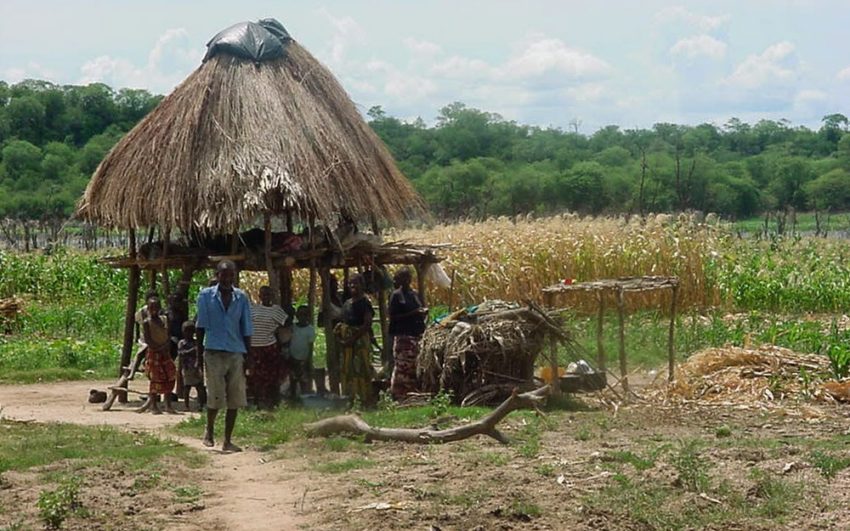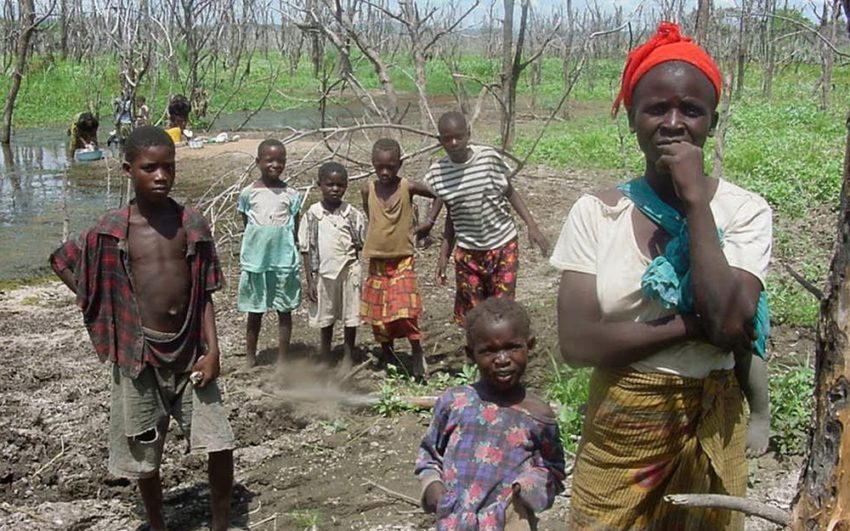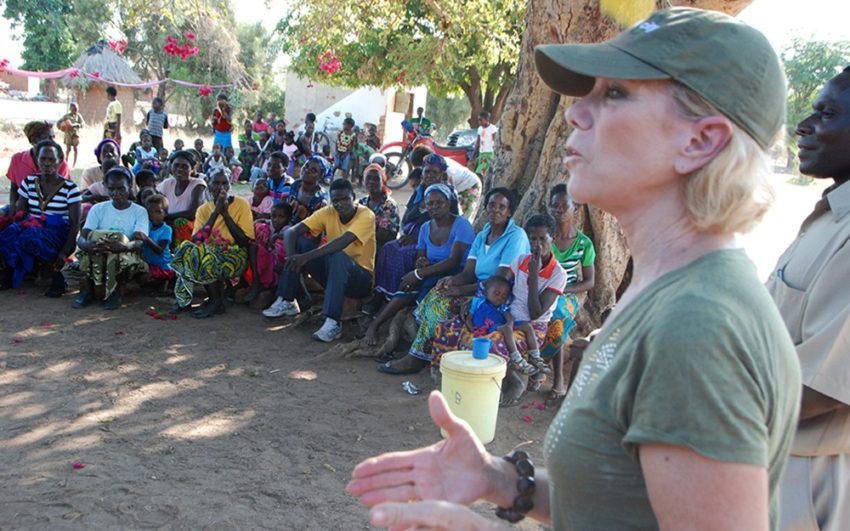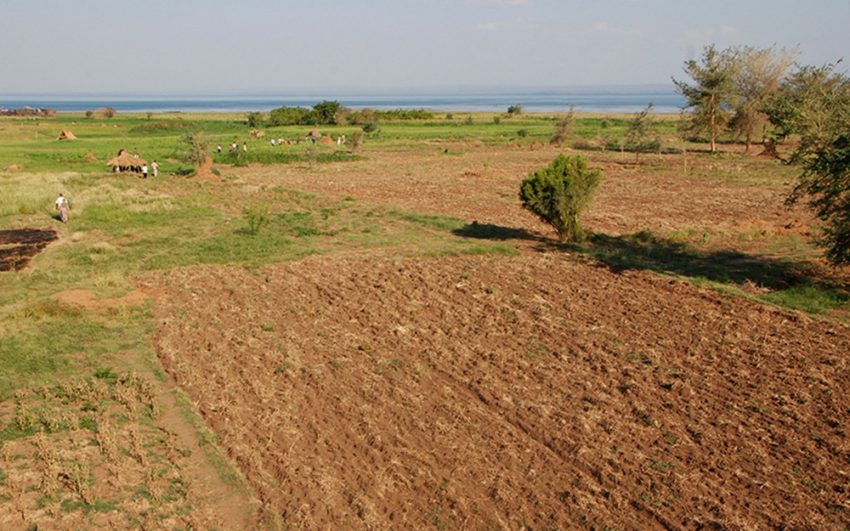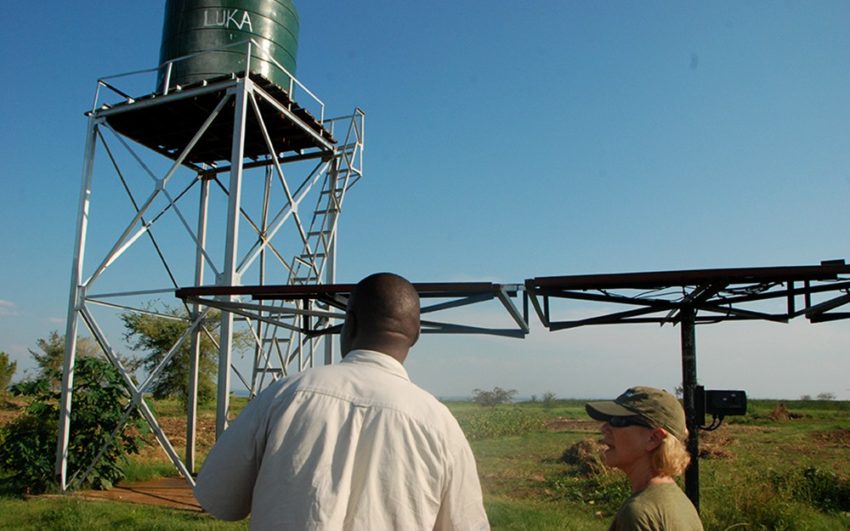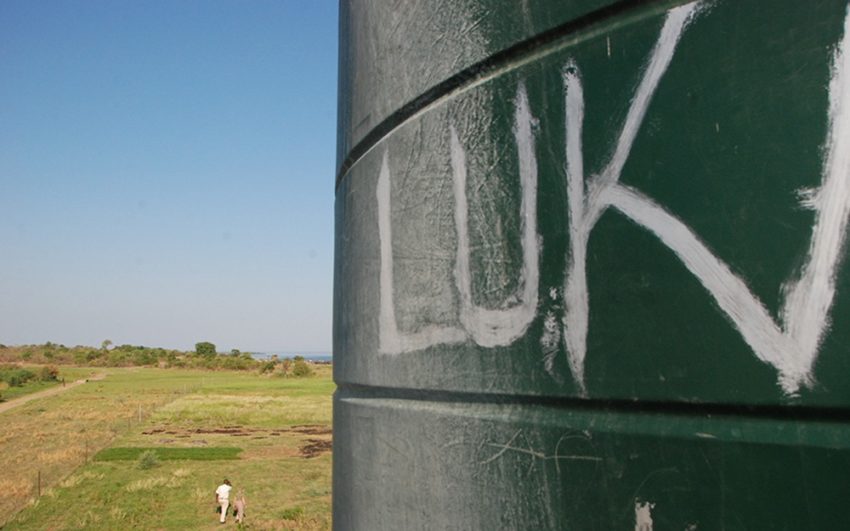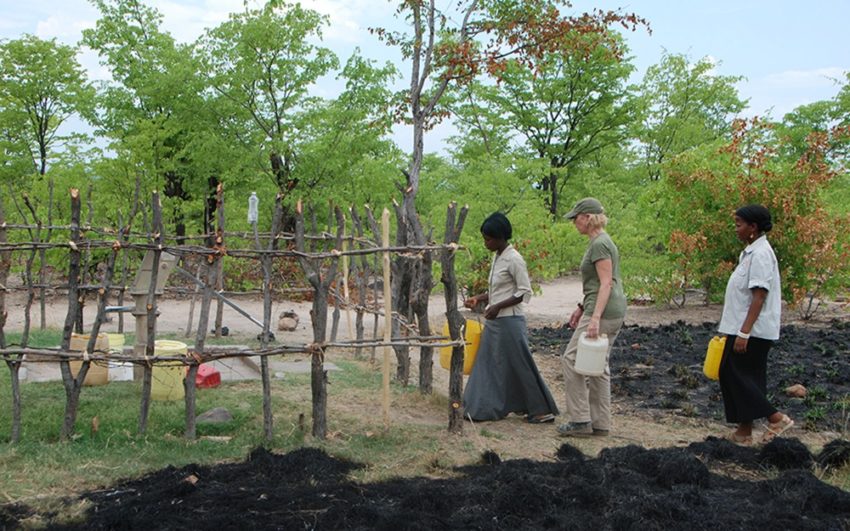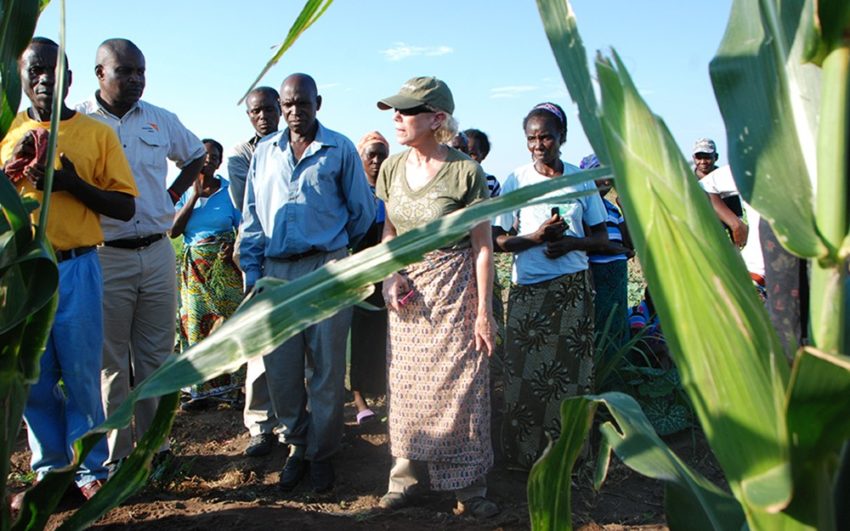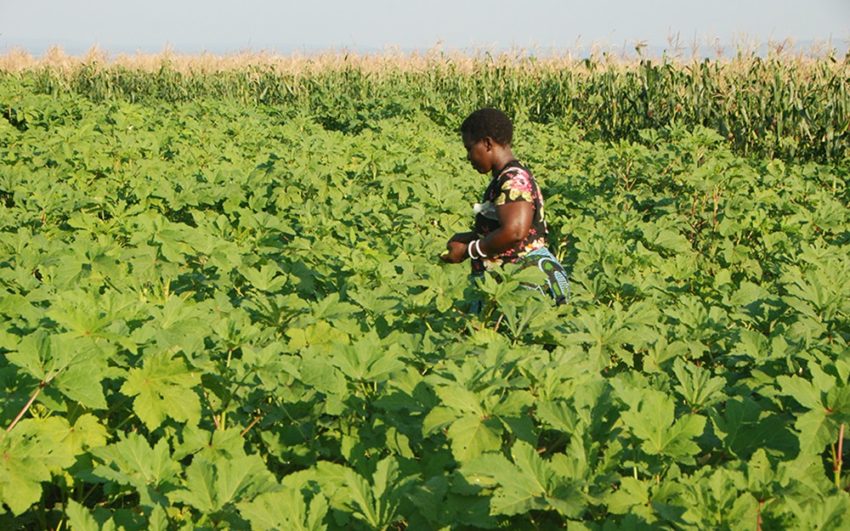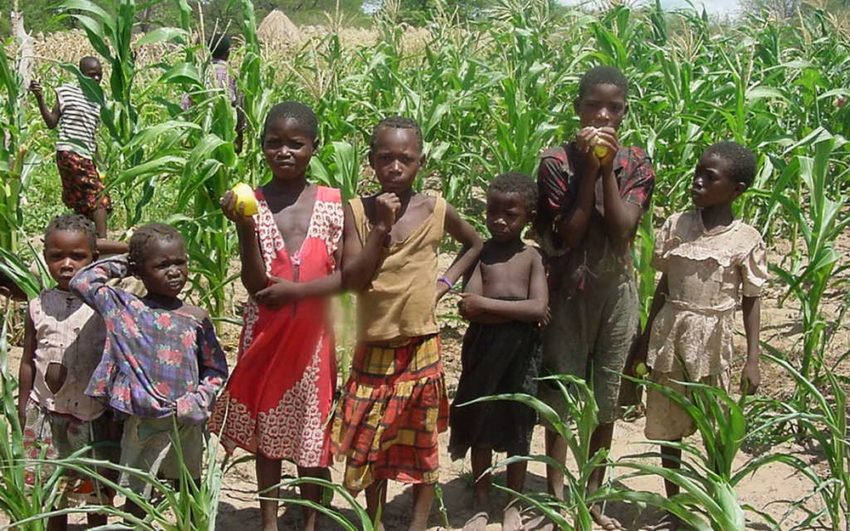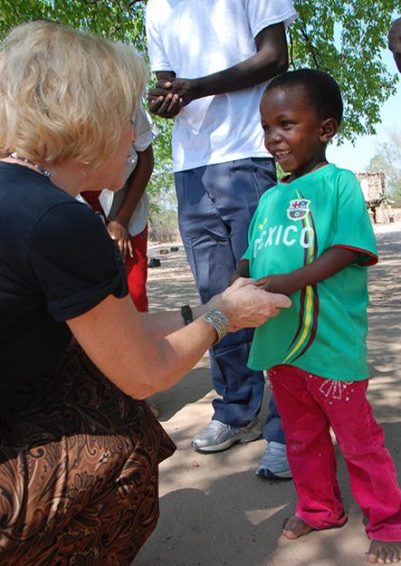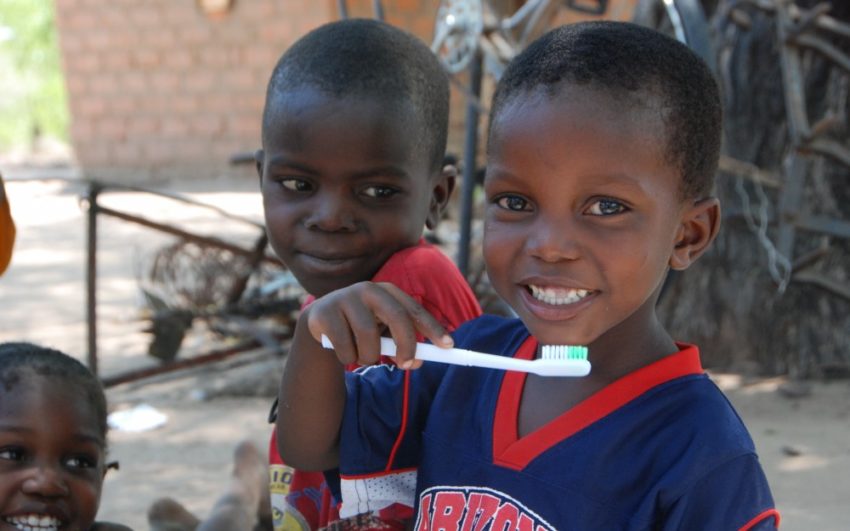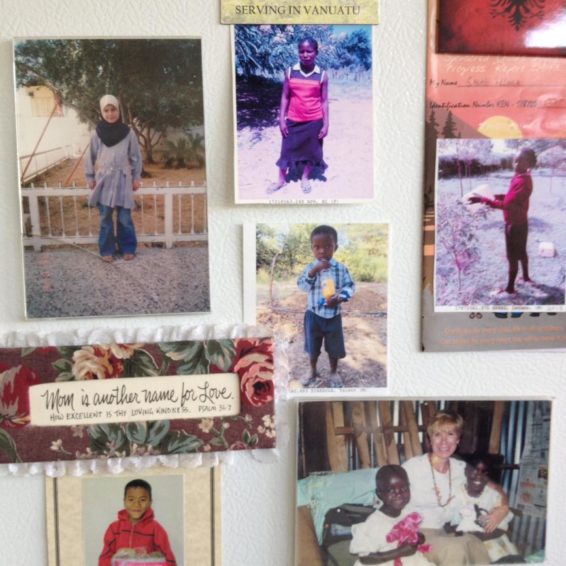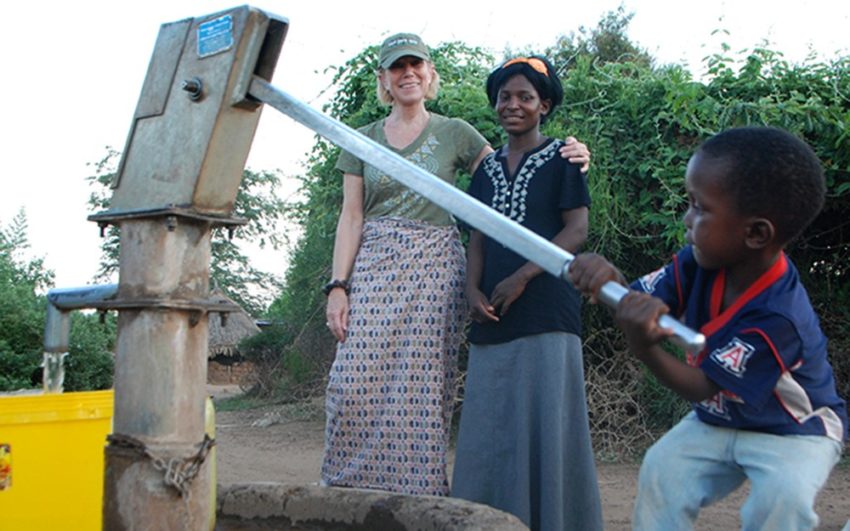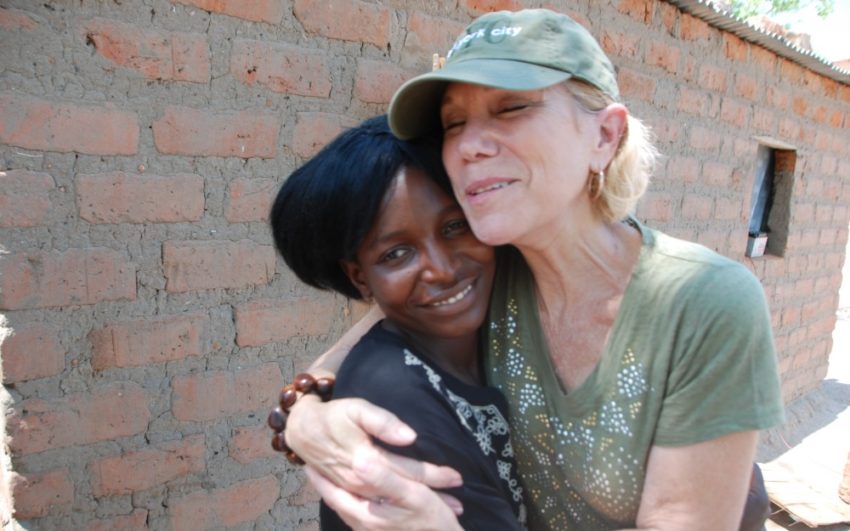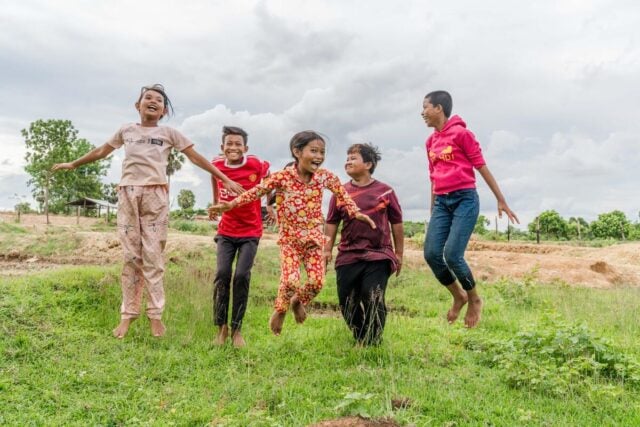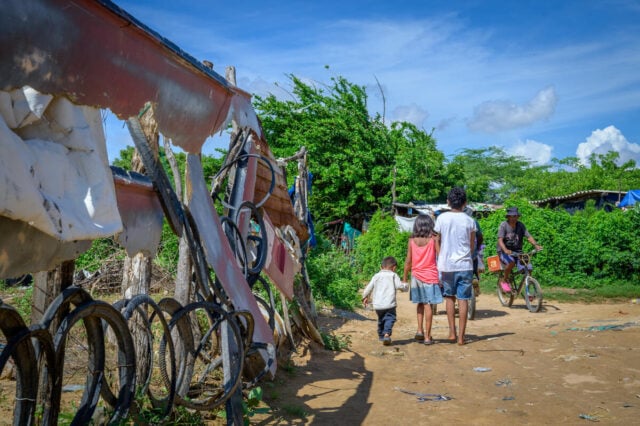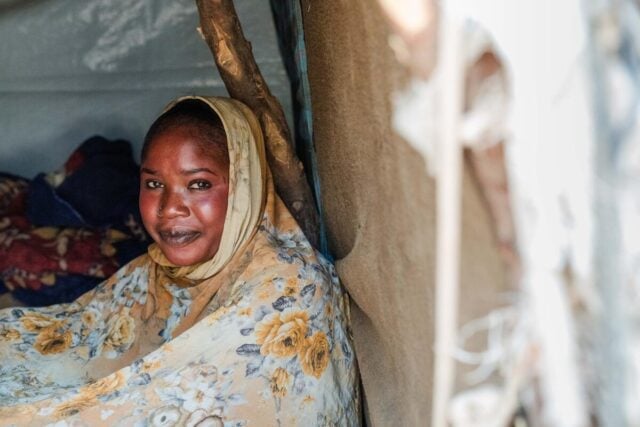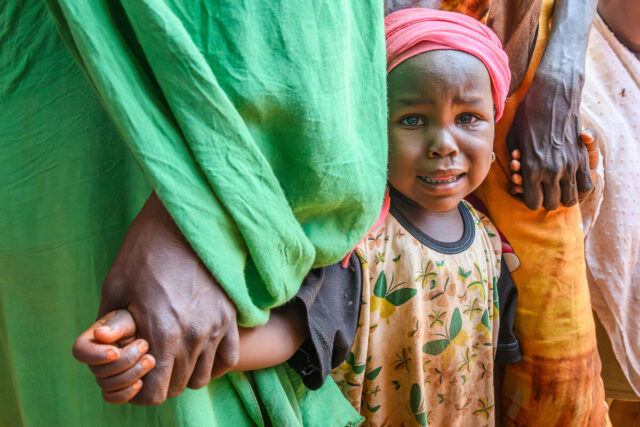I recently returned to Sinazongwe, Zambia, to spend time with my sponsored child Olivia, an orphan who lost her parents to AIDS. My husband and I began sponsoring her in 2003.
It was a meaningful trip for many reasons, as Olivia is now married and the mother of a precocious 5-year-old, appropriately named Talent.
The first time I visited Olivia, in 2003, we made a video entitled “The Miracle of Sponsorship” — and over the next 10 years, Olivia’s story was instrumental in motivating countless donors to sponsor children like her.
When she decided to marry a few years ago, Olivia left World Vision’s sponsorship program, and we might have lost touch. But on a trip to Sinazongwe, a World Vision friend saw Olivia and her son and sent me a photo.
My husband and I took one look at Talent’s little face and said, “That’s our grandson! Why can’t we sponsor him?” And so the miracle of sponsorship continues to bless Olivia’s family and mine.
Now as we are watching Talent grow up, it occurs to me that God has given us a unique opportunity to see the ongoing difference that sponsorship makes — not only in the child’s life, but in the extended family and the community at large.
So last November, I returned to Sinazongwe to spend four days with Olivia, her husband, Clever, and Talent. It was an amazing and life-changing experience as I walked and talked and laughed and cried with the amazing young woman whom I once called “the miracle that is Olivia.”
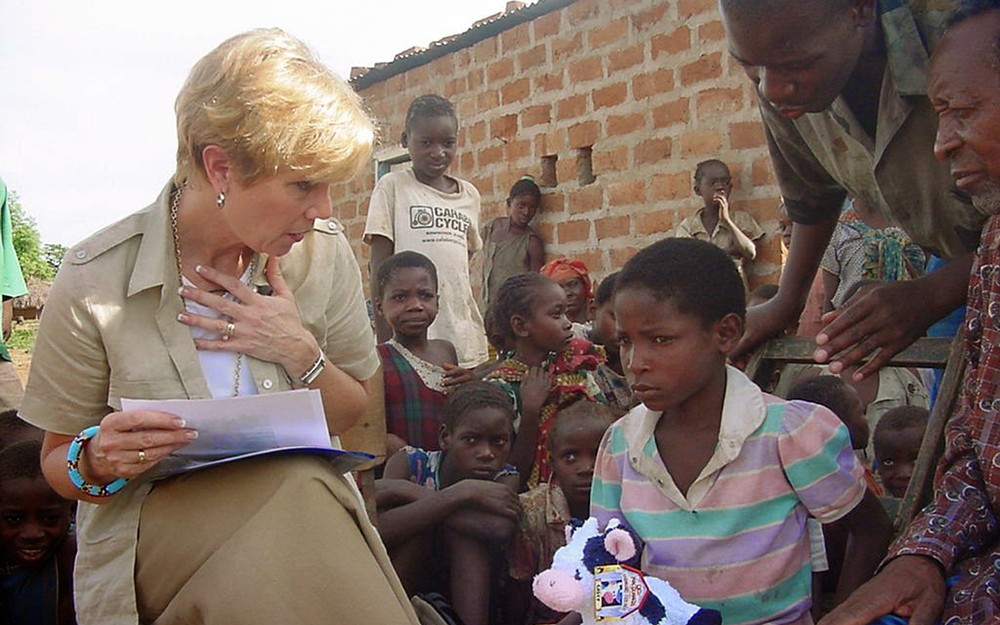
Back to the beginning
Before I share about Olivia’s life today, let me take you back to where our story began. The following is taken from my journal and is dated Jan. 8, 2003.
I met Olivia today. My first impression was how small she is for 10. She isn’t much taller than Vinnie (my 6-year-old grandson). My next thought was how solemn her expression was, but then life has not been kind to this stoic little girl. Olivia’s parents both died from AIDS when she was 2.
Her village is located in a dusty, drought-impacted area with only patches of green and a few barren trees. She lives in a small, two-room house built with clay bricks, and sleeps with her sister on a mattress in a room the size of my closet. It is hot and musty.
Yet Olivia is blessed. She has a grandfather who obviously loves her and one sister and three brothers who make her world rich with family. Her grandfather is also caring for 11 other children left behind by the sons and daughters he has lost to AIDS — 16 children in all!
I was told that Olivia’s day begins at 5 a.m. when she makes the first of several trips to the water well World Vision has provided for her village. Olivia invited me to walk with her to draw water, and I watched the tiny girl struggle to carry the five-gallon bucket back to her house.
My first thought was that this was no job for a small child. But as I watched the fresh, clean water gush from the spout, I couldn’t help thinking of the women I had met who walk miles every day in the hot sun to fill their containers with filthy, disease-ridden water. And I realized that Olivia and her village have been given a precious, life-giving gift in the simple, old-fashioned hand-pump — a gift made possible in part by the small check Bob and I write every month.
Then it was time to sit and get acquainted. We were immediately surrounded by at least 30 village children, all eager to see what I had brought. Olivia was understandably shy, finding the cameras and attention focused on her to be overwhelming. I did not see a real smile until I pulled out the stuffed cow I had brought her and made it “moo.”
As I had hoped, the cow made her laugh, and I began to feel her relax. I continued to pull the small gifts I had brought out of my bag: coloring books, crayons, pencils, and erasers. Every small offering produced excited murmurs from the crowd, as though I had produced treasures of great value.
While Olivia examined her gifts, I asked her grandfather about the difference my sponsorship had made in Olivia’s life. He thought a moment, and then he explained that Olivia had not been able to take her final exams last year to allow her to graduate from first to second grade. The reason was that he could not afford the paper exam book the school required. For want of a piece of paper, this bright little girl had not been allowed to continue her education! But now, because of our sponsorship, Olivia has everything she needs for school, and her grandfather was proud to report that she was doing very well!
Finally, I showed Olivia pictures of my family. I explained that I had her picture on my refrigerator and that every day I prayed for her. The words were no sooner out of my mouth when I realized that Olivia had never seen a refrigerator and her blank look left me feeling a bit foolish. But I hoped she understood that I was trying to tell her that she was part of our family now and that we loved her.
Before we left, Olivia and her sister offered to sing us a song. The girls giggled a bit as they worked up their courage, reminding me of my own little granddaughter when she performs for me in my living room. But when they finally began to sing, their clear, strong voices blew me away. I couldn’t understand the words, but the obvious joy they felt had us all smiling and tapping our feet.
“What are they singing?” I asked our World Vision interpreter.
“I call God on the telephone, and he always answers,” he replied with a grin.
I felt the tears come even as I had to laugh. What an amazing message from the heart of this little girl who had so little.
Two days later, we came back to say goodbye. When we arrived, Olivia ran into her house to get one of the coloring books I had brought her, so she could give me a picture as a keepsake. I followed her inside, standing for a second to let my eyes adjust to the dim light.
As I looked around, my eyes fell on a single picture frame hung upon the naked earthen wall. It was a collage of fading family pictures. I saw Olivia’s parents, grandparents, brothers, and sisters. And there, right in the middle, was the picture of my family. Olivia had us on her refrigerator!
As it came time to say our last goodbyes, I looked into the face of this little girl whom God had placed so uniquely in my family and in my heart, and I wondered what plans He had for her life. I found myself asking the age-old question we adults always ask the young. “What do you want to be when you grow up, Olivia?”
I had asked the question many times before and thought I knew what her answer would be. Most children living in extreme poverty have dreams of becoming doctors or teachers or nurses because these are the people who most positively impact their lives.
But Olivia didn’t answer right away. Instead she looked down, seeming hesitant to speak. Then, in a small voice, she said, “I want to work for World Vision.”
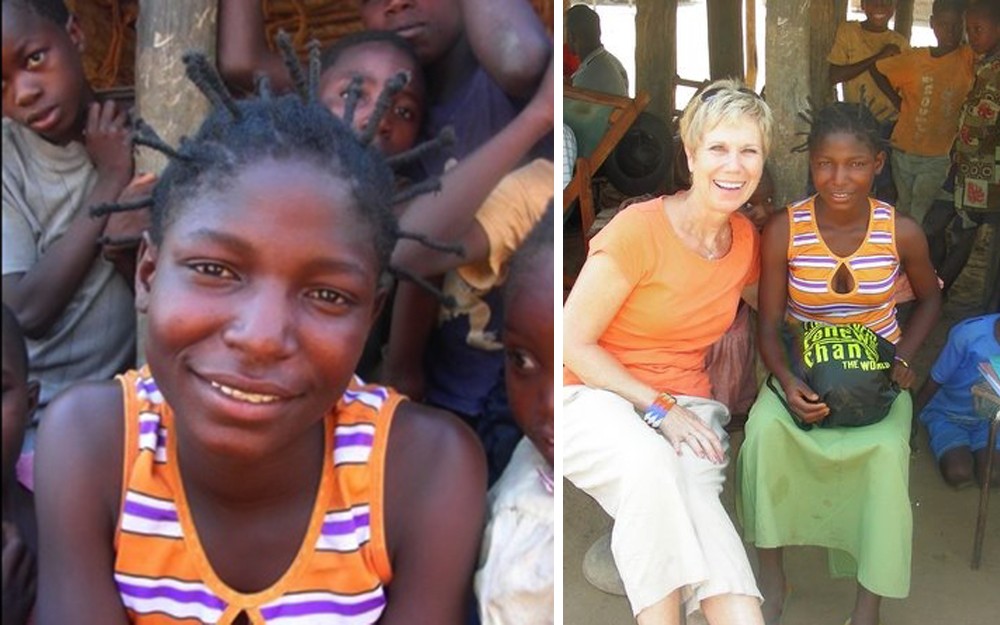
‘Someone loves me’
In 2006, four years after my first visit to Sinazongwe to meet my family’s sponsored child, Olivia, I had the opportunity to return to Zambia. Once again I made the five-hour drive from Lusaka, the capital city, to Olivia’s remote village on the banks of Lake Kariba to see how she was doing.
What a difference a few years and a couple of water wells can make!
I hardly recognized her grandfather’s enlarged compound with its new houses and flourishing gardens. The clucking of chickens and turkeys competed with the welcoming cries of the children who ran out to surround the car as we drove in. I searched their faces for the somber little eyes that I remembered so well, but Olivia wasn’t there. I can still remember the thrill of surprise when I looked up and realized the smiling young woman who was standing quietly, watching me, was my Olivia! She was now 14 and had grown into a lovely young lady.
With a laugh, Olivia gave me a hug and said, “Welcome, mama,” in a voice husky and filled with emotion.
The first time I met Olivia, in 2003, she would barely look at me. Now she took my hand and led me toward the center of the compound where her grandfather, Ensende, waited to welcome me.
While Olivia had definitely gotten older, Ensende seemed to have gotten younger. The sparkle in his eyes as we shook hands was unmistakable. This was a man who no longer carried the weight of the world on his shoulders.
World Vision had come alongside to help him in the tremendous task of feeding and educating his grandchildren — and he was taking full advantage of the help that was offered. But the one thing that hadn’t changed was his obvious love and pride in his granddaughter.
As Olivia took me on a tour of the small community, I saw that several new buildings had been added since my last visit. She excitedly explained that she no longer slept on the floor of her grandfather’s house. Instead, she and an aunt now lived in a separate house that World Vision helped to build. The year before my husband, Bob, and I bought Olivia a proper bed and now this was one of the first things she wanted to show me.
After visiting the well that I had seen my first trip and making sure it was still functioning properly — it was — we sat down to talk. Olivia told me that she was working hard in school and that she sang every Sunday in the church choir. I smiled, remembering the little girl who loved to sing about “calling God on the telephone.” Obviously, He was still answering!
When I asked her if she still wanted to work for World Vision, she smiled shyly and shook her head. “I hope one day to be a teacher,” she said.
I told her that was wonderful — she would be a great teacher. Then I told her that in a real sense she already “worked” with World Vision. “Everywhere I go I share your story and show the video we made,” I said. “Hundreds of children have been sponsored because of you!”
[Sponsorship] means someone loves me.—Olivia
As the time to leave drew near, I asked Olivia one final question: “Tell me the biggest difference our sponsorship has made in your life?”
Her eyes searched her hands as she pondered the question. If there was one thing I have learned about my sponsored daughter, it is that she is a thoughtful person. She took her time to answer. I expected her to say the water wells World Vision had dug had made the biggest difference or perhaps the school fees that sponsorship helped to cover.
But instead, she looked up and said, “It means someone loves me.”
She was right. Somebody does.
P.S. Two years after that visit, World Vision staff informed me that Olivia had opted to leave the sponsorship program to get married and start a family, but the miracle of sponsorship is continuing to bless Olivia and her family.
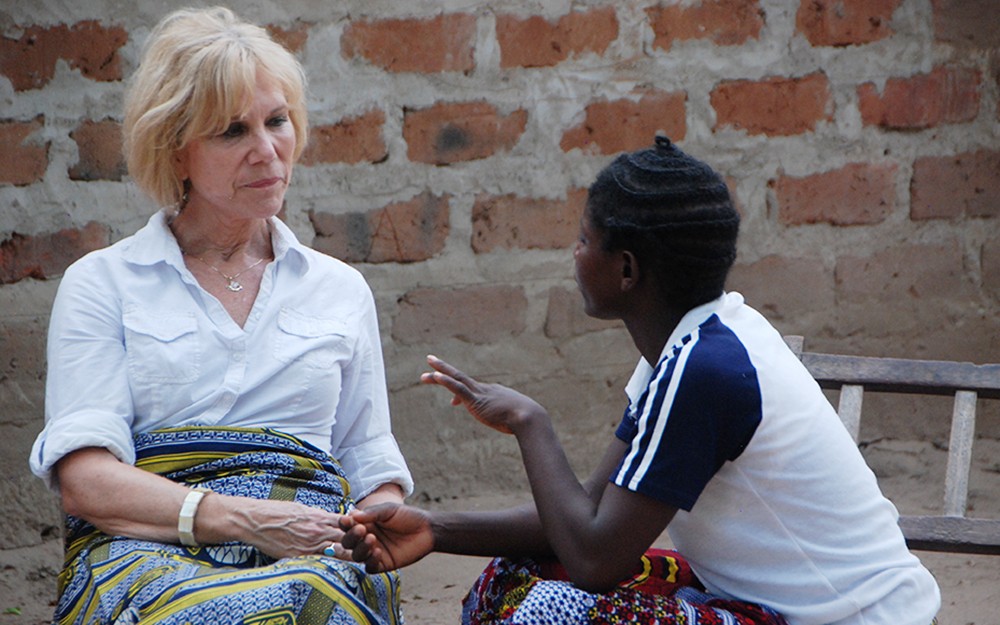
The ravages of malaria
Malaria, an insidious disease, plays a major part in Olivia’s story.
In the months leading up to my visit to Zambia last November, my former sponsored child Olivia and I wrote back and forth to plan exactly how we would spend our four days together. I would arrive on Saturday afternoon and she and her family would be waiting for me at the guest quarters by Lake Kariba where I would be staying.
World Vision staff had arranged for us to go out on a boat, a treat I knew my “grandson,” Olivia’s son Talent, would never forget. The next day, Sunday, I would have the joy of worshipping with Olivia at her home church. Then on Monday and Tuesday, I would spend time with her in her village, and she would tell me about her life. This is what I looked forward to the most — time to talk, time to pray, and time to just enjoy being together.
I was counting down the hours until I left for Zambia when I received an email from Fred Mazumba, the director of World Vision’s Sinazongwe development project (where Olivia and her family live).
“I am sorry to tell you that Olivia is in the hospital with malaria,” he wrote. “She has been very sick, but she is going to be okay. However, she will not be released until Sunday.”
My heart dropped. I knew Olivia had suffered with malaria as a child, but World Vision had provided her and her family with treated nets for years. How could this happen? And why would God allow it to happen now?
Where, O death, is your victory? Where, O death, is your sting?—1 Corinthians 15:55 (NIV)
I have spoken to groups many times about the ravaging impact of malaria, but I was about to learn firsthand about the human toll it takes on the young and the old and even the unborn.
Along with Eddy Rodriguez, a videographer from World Vision in the U.S., and Collins Kaumba, a photographer from World Vision in Zambia, I arrived at the guest lodge as the sun was beginning to set over the lake. We had taken our time driving from Lusaka, Zambia’s capital city, because we knew there was no rush. The boat trip had been canceled, and we did not expect to see Olivia’s husband, Clever, or her son, Talent, until the next day when we would go to church together — without Olivia.
As we pulled up to the lodge, I saw a small group of people standing off to the side. I didn’t realize they were waiting for us until I recognized the little boy peering curiously out from his father’s arms. It was Talent! He and Clever and several World Vision staff had been waiting for hours for us to arrive.
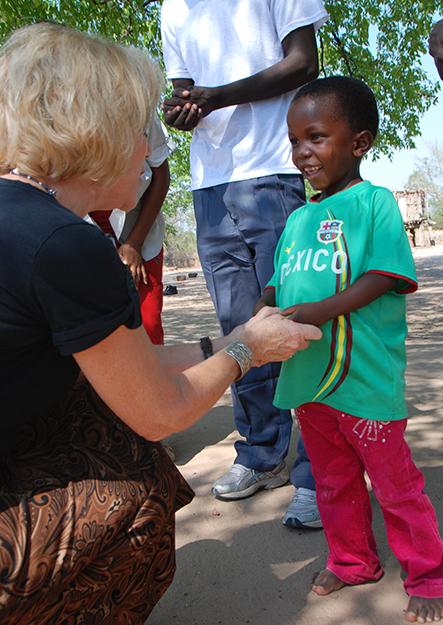
Surprised and delighted, I rushed over to meet my new son-in-law and grandson. At first the 5-year-old was put off by my blond hair and light eyes. But the pieces of candy I dug out of my purse soon bridged the cultural gap, and he was all smiles the next morning when we arrived at his village to attend church.
After the service, we drove about an hour to the hospital where Olivia was recovering. Unfortunately, the doctors would not release her to go home until the next day but we could visit briefly with her there.
I expected to find the patient in bed, but once again we were taken by surprise. As we parked I saw a familiar figure walking towards the car.
“I think that’s Olivia!” I cried out, jumping out of the car with Eddy and his camera scrambling to keep up.
The two of us stopped for a moment and just looked at one another. Seven years had passed since my last visit, and I admit I had to look into her eyes to make sure it was her. Then she smiled and I opened my arms.
It was Olivia, all grown up.
The nurses led us to a shaded courtyard where we could sit and talk. I brought my laptop with me so we could look at the video World Vision had made of my first visit in 2003. Clever and Talent watched with amazed expressions as the screen lit up with images of Olivia and me when she was 10 and I was … younger.
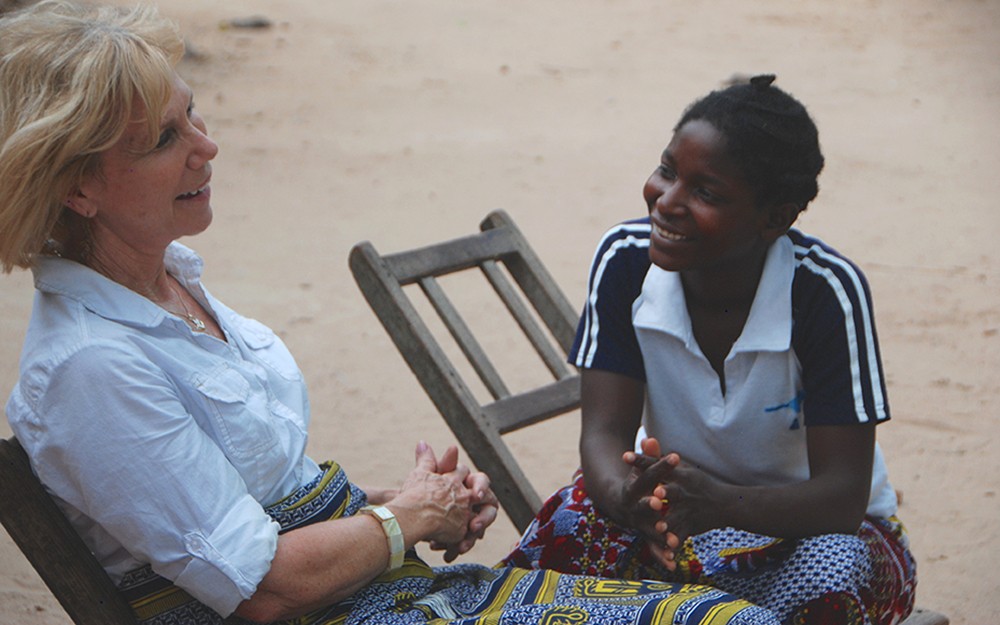
When the video ended I asked Olivia to tell me how she had gotten sick. “Don’t you use the nets we give you?” I asked, sounding a bit like a nagging mother.
“Yes, we do,” she answered, “and they make a big difference. But my grandmother passed away a few weeks ago and my family camped all night outside her house to mourn,” Olivia explained.
“The mosquitoes are bad right now,” Clever added. “They come out after dark. When we go to bed, we use the nets. But the nights are warm and most people want to sit outside to be cool and to talk in the evenings. It is hard not to be bitten.”
“Have any of you had malaria?” I asked, addressing Fred Mazumba and the other World Vision staff with us.
“Oh, yes,” answered Fred. “We have all had it at one time or another.” I was beginning to understand how complicated the problem is and how little I really knew.
“So tell me what it feels like. How did you know you were sick?” I asked Olivia.
“I started feeling weak — like I had the flu. I ached all over and couldn’t eat without throwing up. I knew immediately what it was, and when my temperature went up, Clever took me to the [local World Vision-run] clinic. Because of my history, they sent me to this larger hospital.”
Olivia spoke in a low, flowing voice, the last words coming out in a mere whisper. There was not a lot of emotion in her tone but I could hear the sadness behind the words “because of my history.” The year before, she had been pregnant with twins: a girl and a boy. She was in her seventh month when she was stricken with a bout of malaria. She recovered but went into early labor. The babies were too small and weak to survive without incubators, and the local maternity ward only had one. Unfortunately, it was being used.
Everything possible was done to rush the babies to the larger hospital where we now sat, but they didn’t make it.
“I never got to hold them,” Olivia would share with me a couple days later as we sat in the shade outside of her red brick house. “I don’t know what they looked like.”
Her words pierced my heart. My sister, Robin, lost her second child just days before he was due. I can remember her sharing the pain she felt that she never got to see his little face. Now I saw that same pain in Olivia’s eyes.
“Tell me how you survived this loss,” I asked softly, overwhelmed with my own emotions. “Has your faith in God been a comfort?”
“Yes, very much,” Olivia replied, taking a moment to choose her words. “I know that God loves me and that he loves my babies. I find hope in knowing one day I will see them.”
Moved beyond words by her strength and faith, I took Olivia’s hand. We just sat for awhile, envisioning the joy of that heavenly reunion.
P.S. Before I left to return to the U.S., Olivia confided that part of the reason the doctors kept her at the hospital an extra day was because she was expecting another baby. Her due date was June 10. I have been praying daily since I returned home for her health and safety and awaiting to hear that the baby has arrived.
Today I got an email letting me know that Talent now has a beautiful new sister. Mother and daughter are doing well.
They named her Marilee.

As for me and my household
Like most World Vision sponsors, my husband, Bob, and I have pictures of our sponsored children on our refrigerator. Over the years we have sponsored seven different children, and even after they leave the program, we keep their pictures up to remind us to pray for these special young men and women.
We believe that God “set” these children in our family quite intentionally and I pray for my sponsored children the same way I pray for my own — that they will grow up to have an intimate and powerful faith in Jesus Christ and that their lives will make a difference in the world around them.
Two pictures, in particular, make me smile. One is of a 13-year-old girl looking seriously into the camera as though she is impatient to get on with life. The other is of a little boy holding a bottle of juice. His mother probably gave it to him to get him to stand still long enough to have his picture taken.
What is extraordinary about these two pictures is that they are mother and son.
When I first heard that Olivia was leaving the sponsorship program to get married, I will admit I was disappointed. She was only 16, and I wanted her to finish school and become a teacher as she dreamed. But life and love have a way of redirecting our dreams, and when Olivia wrote to tell me she was expecting her first child, I knew God had given her a new dream.
Arriving in Sinazongwe, Zambia, I could hardly wait to meet her son, Talent. Bob and I had sponsored him since he was 2, and from his pictures, I knew he was a beautiful child. But I was not prepared for the wave of emotion I would feel when I finally looked into those big brown eyes — bright with joy and bursting with curiosity. And I knew immediately that this was a child who, unlike his mother when we first met, had no reason to be guarded or defensive.
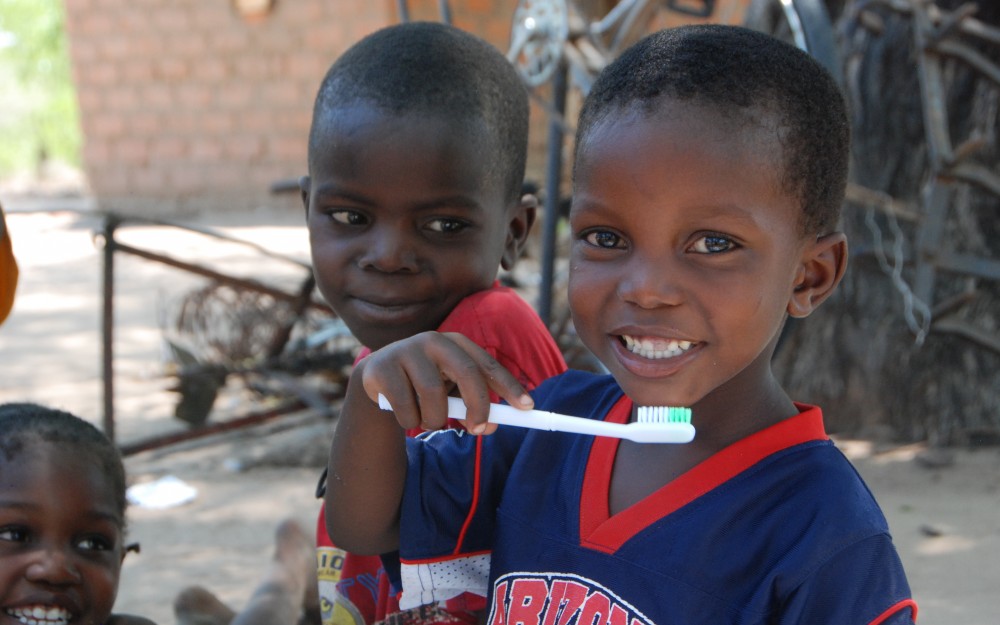
Over the next few days I became Talent’s new best friend. He called me “bene bae” — grandma — and everywhere we went, he took my hand as naturally as my granddaughter, Addison, does at home.
I waited to hand out gifts until Olivia came home from the hospital on Monday. When the moment came, Talent dropped at my feet, his eyes glued to the bulging book bag. I pulled out a shirt and sunglasses for Olivia and a hat and flashlight for her husband, Clever. Then it was Talent’s turn. The little boy “oohed” and awed” over every little gift — a safari hat, crayons, a water bottle — and even the toothbrush got a smile.
Although he had not started school yet, Talent grabbed a pencil and paper to show me how he could write his ABCs. His letters were perfect! When I handed him a new picture book, he eagerly pointed out several words, and it blessed me to see that Olivia had already passed her love for learning on to her child.
Of course, the biggest hit was the soccer ball I saved for last. I think Clever’s eyes lit up as much as his son’s at the sight of the new ball, and the two immediately began breaking it in.
Watching Clever play with his son, I praised God for bringing such a good man into Olivia’s life. At church on Sunday, he had been the first to get out of his seat to dance before the Lord. His son had followed, raising his hands and praising the Lord, just like his daddy.
After church, Clever introduced me to his mother, an elder in the church, and other relatives who make up the small community where he and Olivia live. Then he showed me the two-room house he built for Olivia with his own hands. Unlike the crumbling structure they had first lived in, this house has a cement foundation and was built with fired bricks and real grout.
“This house will last until my son is a man,” he told me proudly.
Finally, we sat and I asked Clever to tell me how he met Olivia. The story he shared was one of the most profound blessings of my trip.
“My parents were Christians, and I grew up in the church. But I was a rebellious youth,” Clever began. “I did not go to church when I got older. Instead, I ran with a bad crowd and got a reputation for being a tough guy. I took pictures for a living and when people didn’t pay me, I would threaten to beat them up.
“Olivia owed me money, and one day I went to collect. But Olivia wasn’t scared. After I threatened her, she looked at me and said, ‘What is wrong with you? You need to get right with God. Why don’t you come back to church?’”
“Something inside of me moved when she said that, and when a friend invited me to church camp the next week, I went. I gave my heart to Christ. Then I asked my friend to go with me to church. Olivia was there.”
Clever’s smile said it all.
“If it were not for my wife, I would not be the man I am today,” he finished simply. “And now I am raising my son to be a man of God.”
The tears were streaming down my face by the time Clever finished. I had never heard this story. I did not know that God had used our daughter, Olivia, to lead this amazing young man back to Jesus. And now they had a son who was being trained up by his parents in the ways of the Lord. “As for me and my household, we will serve the Lord.”
And so the miracle of God’s redeeming love and transforming power goes on, passed from father to son, mother to daughter, generation to generation. Some by birth. Some by sponsorship. All by God’s grace.
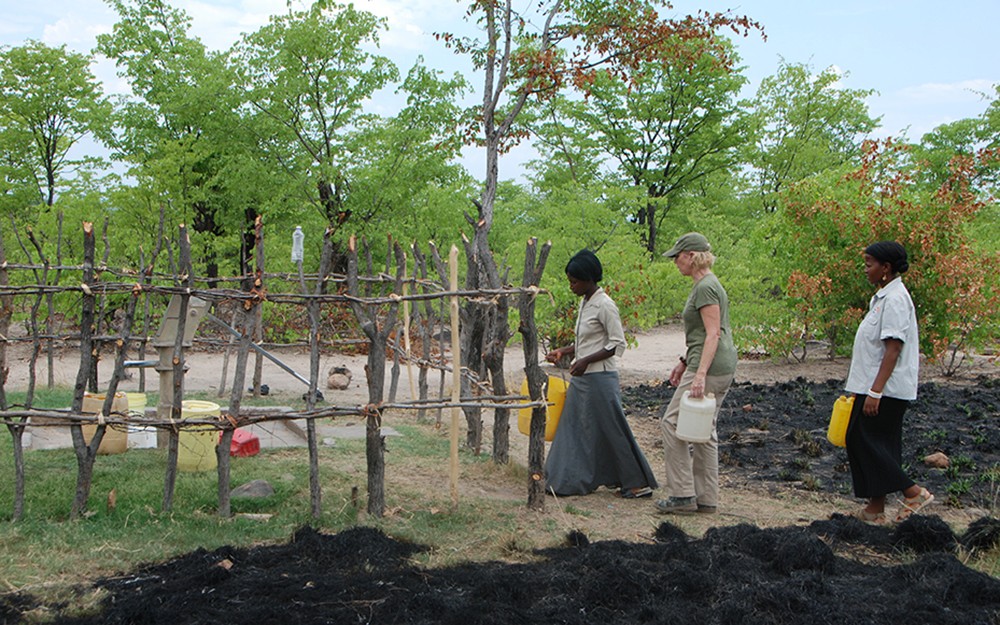
A tale of two wells
When I first came to visit Olivia in 2003, World Vision’s community development work in Sinazongwe had just begun. Southern Zambia was experiencing extreme drought that year and on the four-hour drive from Lusaka I watched the landscape grow more brown and brittle with every passing mile. The cows grazing by the roadside began to look like the “skinny cows” in Joseph’s dream in the Bible, and I wondered if the children living in the huts we passed had started to look that way too.
When I shared my thoughts with my World Vision traveling companions, they confirmed my fears. Many people in Zambia were struggling to survive. Parents would go days without eating in order to feed their children. But they could not go without water — because in this hot, dusty land, water is life.
I knew that our sponsorship had already helped dig a well in Olivia’s community. The water allowed her grandfather, Ensende, to grow his crops; and Bob and I had bought the family some goats and chickens. But before I went to Olivia’s village to see the difference our sponsorship was making in her life, I asked to meet a family living outside of the ring of hope that sponsorship brings to a community.
We drove about 45 minutes to a dusty clearing with a scattering of grass-roofed huts on stilts. Robert and Mary Siancumo and their four children had agreed to meet with us and tell us about their life.
As they led us to a shady spot out of the beating sun, I spotted a small garden. A few green shoots had managed to break through the hardened soil but they looked as wilted as I felt. It was hard to believe they would feed many hungry mouths.
After we talked for a while, Mary invited me to walk with her to the river to get water. We walked about 30 minutes to a dried-up, rocky gulch. There was no water to be seen! But Mary just kept walking towards a group of women and children with an assortment of buckets and containers. They were gathered around a large hole with about two inches of water pooled at the bottom.
This was Mary’s “well.”
As Mary bent over to scoop up the water and pour it carefully into a waiting bucket, I worried about what would happen when the water ran out. Over 60 people depended on this one, pitiful water source.
But miraculously, the water didn’t run out. By the time Mary stopped scooping, every bucket had been filled!
Then it hit me. The river was there, beneath my feet. But without a real well, this hole was the only way Mary could reach it.
The next day I went to meet Olivia, her grandfather, and the 15 other children he was raising. About 10 minutes before we reached the family’s compound, we drove over a dried up creek. For generations, this muddy creek was where Olivia’s family had gotten their water.
I will never forget walking with Olivia for the first time to see the hand-pumped well World Vision sponsorship had built. It was a much shorter walk than the one I had taken the day before, and when I saw the gush of crystal-clear water filling Olivia’s bucket to overflowing, I wondered what Mary would think if she could see this miracle.
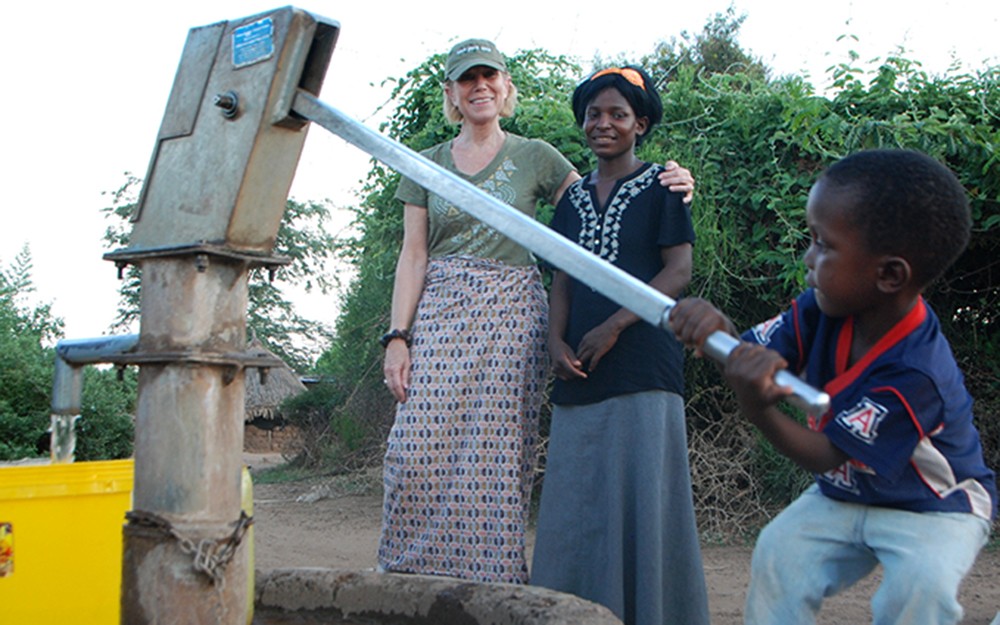
The importance of water in the lives of people like Mary and Robert and Olivia can never be overstated. Nor can the miraculous difference it makes when water is plentiful.
Aside from meeting her husband and son, one of the things Olivia wanted me to see first on my most recent visit was the well World Vision had dug in her new family’s community. It took no more than three or four minutes to walk from the compound to the fenced-off well. As we got closer, I noticed that the ground was blackened from a ring of fire that had been carefully set around the fence to keep the grass low and the animals away. The cement platform surrounding the pump was swept clean and when I pushed the handle down to prime the pump, the action was smooth and easy. It took just a few pumps to get the water flowing.
It was obvious that World Vision had instructed the people about how to maintain the pump to ensure that it would provide water for decades to come. (The next day we would visit Ensende and see the original well Olivia’s family used when she was young. As Talent, Olivia’s son, would demonstrate, it is still in excellent working condition after more than a decade.)
Olivia and I washed our hands under the cool, cleansing water of this new well, and I asked her if she remembered going to the river to get water when she was Talent’s age. She nodded yes.
“It was a long walk for me, and my legs would get tired. The bucket was big and heavy. I would go with my sister, and she would help me put it on my head, but I would spill a lot. It wasn’t easy,” she reminisced, obviously not missing those days.
“So how does it make you feel to know Talent will never have to carry water like you did?” I asked.
Olivia looked up and gifted me with a big smile.
“It makes me very happy.”
“Me, too,” I said, grateful that through sponsorship I had been part of this life-changing miracle.
P.S. A few months after I returned from my first trip to Sinazongwe in 2003, a group of junior high students heard the story of Mary Sinacumo and the river. They raised enough money to dig Mary a well. Another miracle begins.
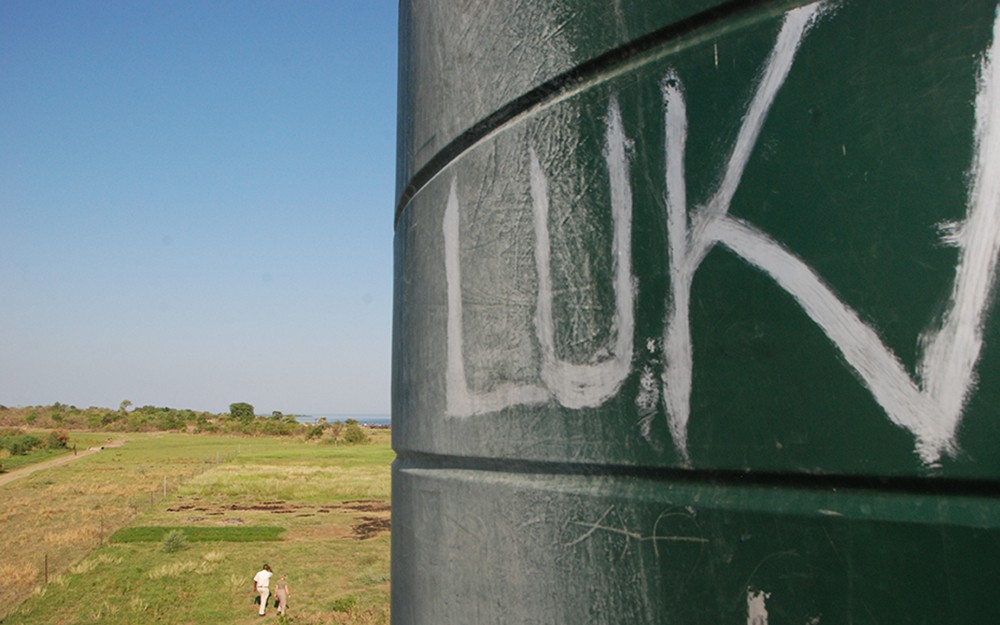
A water tank named Luka
The desert and the parched land will be glad; the wilderness will rejoice and blossom…it will burst into bloom; it will rejoice greatly and shout for joy. … they will see the glory of the Lord, the splendor of our God!—Isaiah 35:1-2 (NIV)
The words of this Scripture rang in my ears as I arrived to meet with members of the community agricultural co-op in Sinazongwe, Zambia, last November. World Vision helped the group in the village where Olivia, my former sponsored child, lives with her husband, Clever, and their son, Talent.
As we got closer, I could hear the joyful singing of the throng of people who had gathered to greet us. Many waved sprigs of flowers and danced in celebration as World Vision U.S. videographer Eddie Rodriguez and I got out of the car along with staff members from World Vision Zambia.
It was a far cry from the scene that had greeted me the first time I visited this farming community in 2003. At the time World Vision was just beginning to educate, equip, and organize the local framers, and the family I visited had yet to benefit from our help.
As I described, Sinazongwe was suffering from extended drought at that time, and the lack of water had led to a food shortage for many of the 150,000 people who lived in the area. Only 60 years before, these skilled farmers had grown nearly 50% of Zambia’s food in the fertile valley around the Zambezi River. Water had rarely been a problem.
But when the government decided to flood the valley to create Lake Kariba, a reservoir that provides much of Zambia with electricity, farmers were relocated to the rocky hillsides around the lake. Now the water they so desperately needed shimmered just a stone’s throw away, giving new meaning to words, “So close and yet so far.”
The farmers I met that day in 2003 had figured out how to make a crude pump to draw water up from the lake. The simple pedal pump was made from two long, rough-hewn wooden planks. Throughout the day, community members took turns standing on the planks and working the pedals up and down. The water was sucked up through a rubber hose that was moved by hand from one thirsty row of crops to the next. Once a field was watered the process started all over again. This went on from sun up to sunset.
The young man who was working the pump when I arrived was shining with sweat, and while he didn’t slow down as we approached, I got the impression he had been at it for quite a while.
“Would you like to try?” the head farmer asked me as the World Vision staff smiled and nodded their encouragement.
I climbed onto the narrow planks and was reminded of the exercise machine I had at home. The fact that I used it to lose excess pounds I put on because of an over-abundance of food was not lost on me as I felt the pedals give under my weight. It only took a few minutes for me to be as “shiny” as the young man before me, and I jumped off with a new respect for what it took to keep that water coming. I had to laugh when a woman with a baby on her back nimbly took my place.
As we drove away after our visit, I snapped a picture of a group of children standing in a lush, green field. They were eating ears of corn fresh off the stalk. Their parents’ hard work was paying off — these children would not go hungry.
But what about the thousands of children whose families did not live close enough to draw water from the lake with a couple planks of wood and a strong pair of legs? How would God meet their needs?
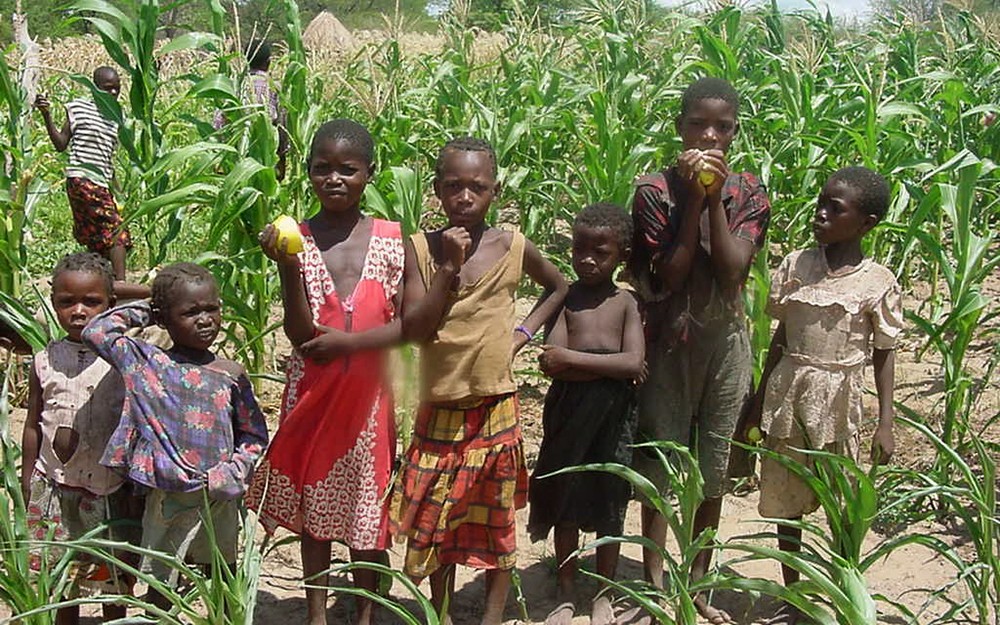
The difference a decade — and sponsorship — makes
Ten years later, the loving reception I got from the community co-op gave me my answer. Using sponsorship funds and other donations, World Vision had helped them build irrigation systems and provided seeds for a variety of drought-resistant crops. As I sat with Olivia’s husband, Clever, under a huge shade tree, co-op leaders explained that they are now growing enough food to not only feed their families but to sell at market as well.
When the ceremony was over, we drove the short distance to what appeared to be an ocean of green fields, stretching as far as the eye could see. Lake Kariba sparkled in the distance, its water obviously no longer out of reach.
We parked beside a modern, solar-powered pumping station. Towering overhead was a huge, green water tank. On the side was painted the word “LUKA.” Having never seen that word before, I asked Fred Mazumba, the director of World Vision’s development projects in Sinazongwe, what it meant.
“World Vision built four tanks like this one and in gratefulness to God the people named them Matthew, Mark, Luke, and John,” he explained, adding with a grin, “but someone misspelled Luke.”
As I walked with Fred through the lush fields of zucchini, tomatoes, lettuce, and corn, I thought of the woman with the baby on her back who had taken my place on that old, wooden pedal pump. I prayed that she and her child were well and blessed.
And I praised God that the day of the pedal pump was over!
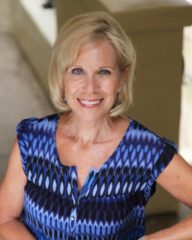
Marilee Pierce Dunker travels the world as an ambassador for World Vision, the organization her father, Bob Pierce, founded in 1950. Like he did, she shares stories, pictures, and personal reflections, bearing witness to the extraordinary ways God is using his people to share the gospel and care for the poor.
Visit World Vision’s Speakers Bureau site to request Marilee or another World Vision speaker to present at your upcoming event.
